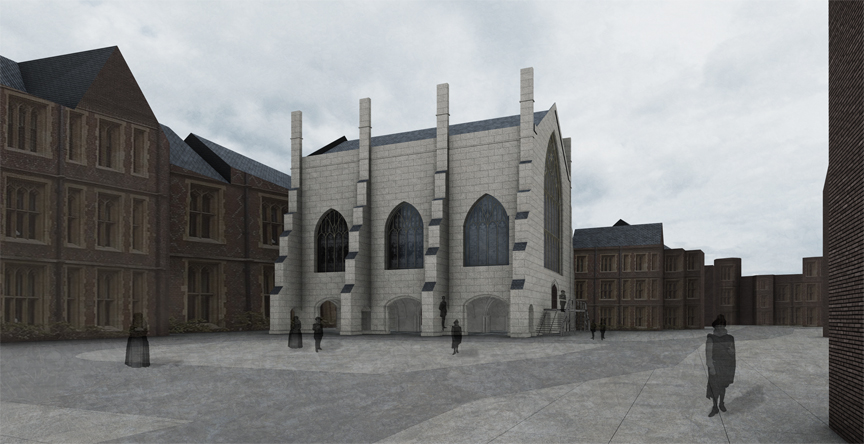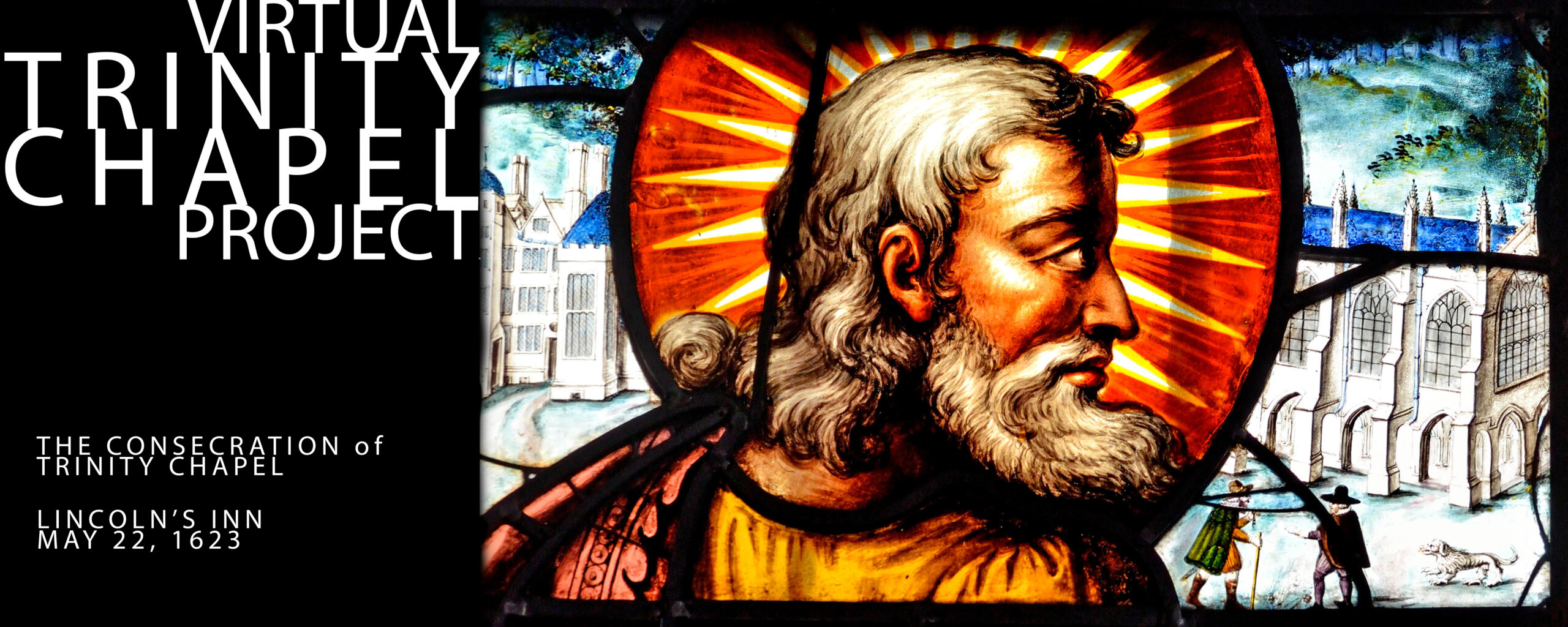Gossip about Donne’s Sermon and the Service at Trinity Chapel

On May 30th of 1623, John Chamberlain wrote to his friend Sir Dudley Carleton news of the current topics of conversation in London.
To Sir Dudley Carleton,[1] [London, May 30, 1623.]
My very goode Lord: All your affaires here are in goode case and prosper, and those clouds and mists removed that threatned fowle weather.
Yt cannot be but a great comfort as well to yourself as all your well-wishers to see so many goode frends stand so close to you, (a rare thing as the world goes) for yt is an old rule that amicus certus in re incerta cernitur,[2] and yt shewes you are rich in that kind; so that there is no doubt but all shall succeed well hereafter, and that the white mule[3] wilbe more tractable, or yf he shold continue his jades tricks you are provided of an antidot against all venome, for saepe premente Deo fert Deus alter opem.[4]
The earle of Rutland,[5] the Lord Morley,[6] and the Lord Windsor[7] tooke their leave at court on Sonday in their best array and their followers well apointed in faire and rich liveries.
The King was scant pleased that they were no more forward to take the benefit of this faire wind and hastned them all he could, so that yt is thought they be of the coast before this time, and wilbe soone at the Groine (whether they be bound) yf the wind hold goode.
On Monday the Duke of Richmond,[8] the Lord Treasurer,[9] Marques Hamilton,[10] Lord of Arundell,[11] Secretarie Calvert[12] and I know not who els are to go toward Southampton to set all things in order thereabout for the reception and entertainment of the Infanta, and all westward there is commaundment for musters and other provisions yf occasion serve.
Yet all this while we have had no newes from Spaine since I wrote last, which breedes suspicion that there is some stop or restraint in Fraunce.
The Lord Lepington[13] landed this weeke and hath brought backe all or most part of the Princes servants that were sent after him; they have had the pleasure of going and comming backe from Spaine by sea, for I heare of few or none but himself that went to Madrid, whence he came before Gresly[14] and Clarke[15] that arrived here three weekes since: he came post from the sea-side and delivered all he had to the King but otherwise he either knowes or sayes litle, as likewise the Lord of Carlile[16] is very silent, yet somwhat breakes out sometimes as that at his comming away the Infanta gave him leave to kneele to her above an howre, which is thought to be more then needed either to be given or receved, wherupon our great Ladies begin to consult how to demean themselves when she comes, specially the double Duchesse,[17] or (as some waggs call her) the Duchesse cut upon Duchesse, and that perhaps hath bred a speach that at the mariage the Prince may be made or have the title of King of Scotland or Ireland, that the Infanta may be a Quene as well as her sister of Fraunce.
In the meane time some mutter that we presume much upon the Spaniard that we trust him with our only Prince, the principall and richest jewells of the crowne, and the best part of our navie all atonce, besides so many other men of worth: but yt is aunswered again, that for their owne interest yt stands them upon to kepe touch with us, beeing as yt were without all other frends.
We look daylie to heare of the solemnisation of the mariage. The Lord Rochfort[18] is to bring the newes of the time apointed, the Lord Denbigh[19] of the consummation, and the Lord Andover[20] when they set out toward the sea-side.
About this day sevenight the Spanish ambassador[21] laide the foundation or first stone of the chappell that is to be built at St. James for the Infanta.
Other ceremonie I heard of none but of a crosse and that he gave some 25″ among the workemen and overseers: but Lincolns Ynne new chappell was consecrated with more solemnitie by the bishop of London[22] on Ascension day, where there was great concourse of noblemen and gentlemen wherof two or three were indaungered and taken up dead for the time with the extreme presse and thronging.
The Deane of Paules [23] made an excellent sermon (they say) concerning dedications.
Sir William Mounsons eldest sonne[24] (not he that shold or wold have ben the favorite) was committed to the Gatehouse on Sonday by some of the counsaile, for arguing in some points of Poperie at the Lord of Notingams[25] table, and avouching before all the companie that the King was a papist in heart, whatsoever shew he made outwardly to the contrarie.
The Lord Walden[26] hath had yll lucke of late, for the last weeke he lost above 1500 in one day at bowles at Hackney, and fowre or five hundred two dayes before, of all which the Lord of Mongomerie[27] caried away the greatest part.
So with all goode wishes I commend you to the protection of the Almighty.
From London this 30th of May 1623.
Your Lordships most assured at commaund.
John Chamberlain.[28]
[1] 1st Viscount Dorchester (1573–1632). In 1623, Carleton was the English ambassador to the Hague.
[2] Literally, “A true friend is recognized in uncertain circumstances,” or, colloquially, “A friend in need is a friend indeed.”
[3] George Villiers, Marquis of Buckingham. Carleton’s letters to Chamberlain, ed. Maurice Lee (New Brunswick, NJ: Rutgers University Press, 1972), pp. 293-314) from this period do not clarify what is at issue in this discussion, but clearly Chamberlain is reassuring Carleton that a potentially difficult situation regarding Carleton’s relationship with Buckingham has been resolved positively for Carleton because influential friends have come forward to intervene. Whatever the issue, the tone of this letter makes clear that Chamberlain (and presumably Carleton) does not view the Spanish Match favorably, in part because of the more positive and tolerant view of Catholicism it implies for the King and his senior advisors.
[4] “Often, when (a) god is (op)pressing (you), another god brings help.”
[5] Francis Manners, (1578–1632), became Earl of Rutland when he inherited the title in 1618 from his cousin William Cecil (1590–1618). Buckingham’s father-in-law and a prominent Catholic peer, he was appointed Admiral to lead the flotilla of ships originally intended for Spain to carry the Infanta to England. The flotilla left England at at the end of July 1623.
[6] Henry Parker, Lord Morley, a Catholic peer, and presumably also a member of the flotilla intended to retrieve Charles from Spain, that sailed from England at the end of July 1623
[7] Thomas, Lord Windsor, a Catholic peer, was appointed Rear-Admiral in 1623 and was a member of the flotilla intended for Spain that left England in late July 1623
[8] Ludovick Stuart, second Duke of Lennox and first Duke of Richmond
[9] Lionel Cranfield, first Earl of Middlesex
[10] James Hamilton, 2nd Marquess of Hamilton and 4th Earl of Arran KG PC (1589 – 1625)
[11] Thomas, First Lord Arundell of Wardour (1560-1639), a Catholic who was named Lord Arundel by James I in 1605.
[12] George Calvert (1579 – 1632), Secretary of State under James I, lost power over support for the Spanish Match, later supported creation of colony of Maryland as a haven for English Catholics.
[13] Robert, first Lord Carey of Leppington
[14] Walsingham Gresley
[15] Edward Clarke
[16] James Hay, first Earl of Carlisle
[17] Frances, wife of Ludovick Stuart, second Duke of Lennox and first Duke
of Richmond
[18] Henry Carey, Viscount Rochford
[19] William Fielding, first Earl of Denbigh
[20] Thomas Howard, Viscount Andover
[21] Don Carlos Coloma – Chamberlain refers to the laying of the cornerstone for a Roman Catholic chapel for use by the Spanish princess then under negotiation to become the wife of the future Charles I. Unlike Trinity Chapel, this chapel, now known as the Queen’s Chapel, was designed by Inigo Jones.
[22] George Montaigne
[23] John Donne
[24] Theophilus Howard, eldest son of Thomas Howard, first Earl of Suffolk.
[25] Charles Howard, first Earl of Nottingham
[26] Theophilus Howard, eldest son of Thomas Howard, first Earl of Suffolk.
[27] Philip Herbert, first Earl of Montgomery
[28] John Chamberlain, Letters, ed. Norman Egbert, II, p. (Philadelphia, American Philosophical Society, 1939), p. 135.
